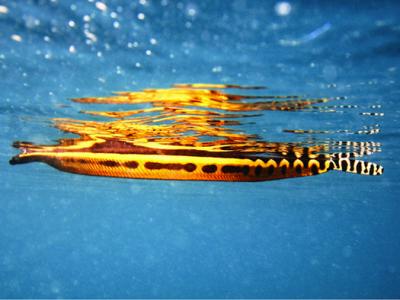Man Wrestles 7-Foot Shark to Nantucket Beach
Elliot Sudal grabs a sandbar shark on a Nantucket beach.
When Elliot Sudal goes to the beach, he doesn't just lay out in the sun. He wrestles sharks.
On July 14, Sudal spent 45 minutes writhing in the Nantucket surf with a seven-foot (two-meter) sandbar shark. Eventually, he got the animal to shore, then released it a few moments later. The encounter was recorded by his companions and posted online, where it has gone viral. A number of shark advocates have expressed concern about potential injury to the animal.
"I pull them on shore, I photograph them, and then I let them go, I'm pretty conservation minded, I'm not trying to eat them or hurt them," Sudal told National Geographic.
The 24-year-old is originally from Burlington, Connecticut, but he recently moved to Massachusetts' Nantucket Island. Before that, he lived in Florida, where he was also an avid surf fisherman.
Sudal said he has caught-and-released a hundred sharks over the past eight months, the majority of them in Florida. "They have a lot more sharks down there than in Nantucket," he said.
"It's my favorite thing to do," Sudal added. "I've been fishing my whole life. It's almost like a drug, it seems like I can't go more than a few days without fishing.
"The bigger the fish the better. It's a big epic battle—after catching a big shark you can't really go back to catching five-pound fish."
"Epic Battle"
On Sunday, Sudal had set out four fishing lines from the beach. He noticed some dead bluefish floating in the waves with shark bites on them, so he grabbed one and tossed half of it back out toward his hooks. A sandbar shark emerged, and then took one of the hooks.
Sudal called the catch "an amazing experience." He said it feels like he develops a relationship with the animal when he spends so much time trying to wrestle it to shore.
Asked what compels him to plunge into the surf to literally pluck writhing animals from the sea, Sudal said, "After hooking a shark, I realized I gotta go grab this now, so you just hope for the best. The shark is freaking out."
Sudal said that the most intense moment is when he first feels the sandpaper-like roughness of the shark's skin. "With the splashing, a lot of times you can barely see, so if something bad were going to happen, it would happen then," he said of the first few moments.
Asked if he is ever scared of getting bitten, Sudal admitted he is terrified. "They can cut a fish in half no problem, so think what they could do to a leg," he said. "But knock on wood, I haven't had any problems yet."
He added that there are only around 70 shark attacks reported a year worldwide. Sudal said the largest fish he has ever hauled in was a ten-foot (three-meter) bull shark that he caught in Florida.
Sudal has a captain's license and works for a company called Nantucket Moorings. He helps guide boats to the dock, including multimillion-dollar yachts of the rich and famous, who come to relax in Nantucket.
"Pretty much every day I go to work, go to the gym, and go fishing," said Sudal, describing a routine that may be the new "GTL" —gym, tan, laundry —phrase for a generation raised on Jersey Shore.
Shark Advocates Express Concerns
Bradley M. Wetherbee, who studies shark behavior and ecology at the University of Rhode Island, told National Geographic that the shark in the video is a sandbar shark. "It's a species that cannot [legally] be retained, so at least he let it go," said Wetherbee.
"Not the ideal treatment for a shark, but he got a lot of attention and that was probably the whole point."
Wetherbee added, "One could certainly let the shark go in a less dramatic fashion, but in the end the shark is hopefully out there swimming around rather than dead and cut up."
Wetherbee said shore fishing for sharks is common along the East Coast, where protected species like sandbar and sand tiger sharks get caught, photographed, and then released, which is not against the law. (Killing them is prohibited.)
Wetherbee said his research group is conducting a study on the fate of sand tiger sharks caught and released in Delaware.
Expressing concern about the video, marine scientist Amanda Keledjian with the environmental group Oceana said such catch-and-release tactics could still injure sharks. "Sharks have very sensitive bodies, with some even having to keep water moving over their gills to breathe," she said.
"Sharks can also easily have their internal organs bruised or damaged, which wouldn't be apparent after immediately being released," Keledjian said. She added that stress from the encounter could result in lower reproductive output.
Author and ocean advocate Carl Safina told National Geographic that sandbar sharks used to be commonly seen in the summer in shallow waters around the Northeast, although their numbers dropped in recent decades thanks to commercial fishing.
For his part, Sudal says he has been talking to everyone who will listen about the importance of shark conservation.
"I am getting backlash, but the Chinese kill a hundred million sharks a year for their fins," he said.
"And I let this one go, and I didn't do anything illegal."
What do you think: is catch-and-release fishing of sharks a good way to enjoy nature?
Brian Clark Howard
National Geographic
Published July 17, 2013












